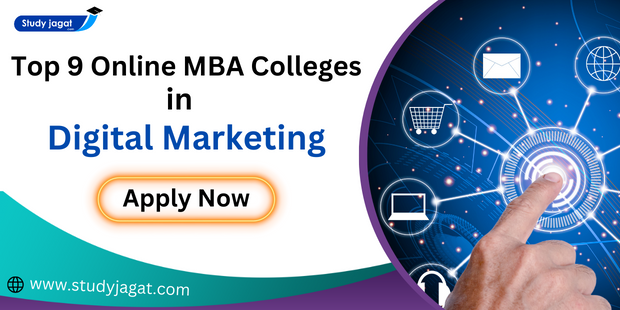Top 9 Online MBA Colleges in Digital Marketing: Rankings, Fees, and Admission

Online MBA colleges offering specializations in Digital Marketing cater to individuals seeking advanced knowledge and skills in leveraging digital platforms for marketing purposes. These programs are designed to meet the evolving needs of businesses in the digital age and provide students with a comprehensive understanding of marketing strategies, tools, and technologies.
In an Online MBA program specializing in Digital Marketing, students typically learn about various aspects of digital marketing, including:
Digital Marketing Strategies: Understanding different digital marketing channels such as social media, search engine optimization (SEO), email marketing, content marketing, and online advertising. Students learn how to develop effective strategies to reach target audiences and achieve marketing objectives.
Consumer Behavior in the Digital Age: Exploring how consumer behavior has evolved with the rise of digital technology and how marketers can leverage insights to create targeted and personalized marketing campaigns.
Analytics and Data-Driven Decision Making: Learning how to collect, analyze, and interpret data from digital marketing campaigns to measure performance, optimize strategies, and make informed marketing decisions.
E-commerce and Online Brand Management: Studying the principles of e-commerce and online retailing, including website optimization, customer experience management, and brand-building strategies in the digital space.
Social Media Marketing: Delving into the intricacies of social media platforms, understanding audience engagement, content creation, influencer marketing, and community management.
Search Engine Optimization (SEO) and Search Engine Marketing (SEM): Exploring techniques to improve website visibility in search engine results pages (SERPs) through organic SEO strategies and paid advertising campaigns.
Content Marketing: Learning how to create compelling and relevant content across various digital channels to attract and engage target audiences and drive conversions.
Mobile Marketing and App Development: Understanding the unique challenges and opportunities in mobile marketing, including mobile advertising, app development, and mobile optimization strategies.
Online MBA colleges offering specializations in Digital Marketing often integrate real-world case studies, projects, and internships to provide students with hands-on experience and practical skills. Additionally, they may offer networking opportunities with industry professionals and access to cutting-edge digital marketing tools and technologies.
List of Top Online MBA Colleges in Digital Marketing
Enquiry Now
Amity University Online: Amity University is a private university with campuses across India. It is known for its diverse range of courses and emphasis on research and innovation. The online MBA program in Digital Marketing offered by Amity University is designed to provide students with a comprehensive understanding of marketing strategies in the digital age.
Online Manipal University: Situated in Jaipur, Rajasthan. Online Manipal institution is a deemed institution. It provides a range of online courses, one of which is an Online MBA in Digital Marketing. The curriculum is made to give students the information and abilities necessary to succeed in the field of digital marketing, which includes analytics, SEO, social media marketing, and more.
Chandigarh University Online: Chandigarh University is a private university located in Chandigarh, Punjab. It offers an online MBA program with a specialization in Digital Marketing. The program focuses on providing students with a strong foundation in marketing principles along with specialized knowledge in digital marketing strategies and tools.
NMIMS University: NMIMS University, also known as Narsee Monjee Institute of Management Studies, is a private university located in Mumbai, Maharashtra. It offers an online MBA program with a specialization in Digital Marketing. The program covers various aspects of digital marketing, including social media marketing, content marketing, and e-commerce.
GLA University Online: Located in Mathura, Uttar Pradesh, GLA University is a private university. It provides a Digital Marketing MBA program online. The curriculum is made to give students the abilities and information needed to succeed in the quickly developing profession of digital marketing.
Suresh Gyan Vihar University (SGVU): Suresh Gyan Vihar University (SGVU) is a private university located in Jaipur, Rajasthan. It offers an online MBA program with a specialization in Digital Marketing. The program covers topics such as digital advertising, consumer behavior in the digital age, and online brand management.
Institute of Management Technology Ghaziabad: The Institute of Management Technology (IMT) is a premier management institute with campuses in Ghaziabad, Nagpur, Hyderabad, and Dubai. It offers an online MBA program with a specialization in Digital Marketing. The program focuses on providing students with a strong foundation in marketing principles and practical skills in digital marketing strategies.
Lovely Professional University (LPU) Online: Lovely Professional University (LPU) is a private university located in Jalandhar, Punjab. It offers an online MBA program in Digital Marketing. The program is designed to equip students with the knowledge and skills needed to succeed in the competitive field of digital marketing.
Jain University Online: Jain University is a deemed university located in Bangalore, Karnataka. It offers an online MBA program with a specialization in Digital Marketing. The program covers various aspects of digital marketing, including social media marketing, search engine optimization, and online advertising strategies.
Why Choose an Online Digital Marketing Course in India
Choosing an online digital marketing course in India offers several advantages, including:
Flexibility of Online Learning: Online courses provide flexibility in terms of scheduling and location. Learners can access course materials and participate in discussions at their own pace and convenience, allowing them to balance their studies with work, family, or other commitments. This flexibility is particularly beneficial for working professionals who wish to upgrade their skills or pursue further education without disrupting their careers.
Industry-Relevant Curriculum: Online digital marketing courses in India are often designed in collaboration with industry experts and updated regularly to reflect the latest trends, tools, and technologies in the field. They provide practical, hands-on training that equips learners with the skills and knowledge needed to succeed in the dynamic and competitive digital marketing industry. Additionally, many online courses offer case studies, real-world projects, and opportunities for networking with industry professionals, enhancing the relevance and applicability of the curriculum.
Cost-Effective Option: Online digital marketing courses in India are typically more affordable than traditional classroom-based programs. They eliminate the need for commuting and accommodation expenses, making them a cost-effective option for learners from diverse backgrounds. Additionally, online courses often offer flexible payment options, scholarships, and financial aid opportunities, further reducing the financial burden on students.
Accessibility and Convenience: Online courses are accessible to learners across India, regardless of their geographical location. This accessibility is particularly beneficial for individuals residing in remote or underserved areas who may not have access to quality education institutions or programs. Furthermore, online courses eliminate the need for physical classrooms, allowing learners to study from the comfort of their homes or any location with internet access. This convenience makes online learning an attractive option for busy professionals, students, or individuals with mobility constraints.
Admission Procedure for Online Digital Marketing Course
Here’s a detailed explanation of the admission process for online MBA colleges, including eligibility criteria, application procedure, and entrance exam requirements:
Eligibility Criteria:
Educational Qualifications: Candidates must typically hold a bachelor’s degree in any discipline from a recognized university or institution.
Minimum Percentage: Some colleges may specify a minimum percentage requirement for the bachelor’s degree, often ranging from 50% to 60%.
Work Experience: While not always mandatory, some online MBA programs may prefer candidates with relevant work experience, especially for executive MBA programs.
Entrance Exam Scores: Certain colleges may require candidates to have valid scores in national or state-level entrance exams such as CAT, MAT, XAT, GMAT, or others. However, some colleges may also offer admission based on merit or internal entrance exams conducted by the institution.
English Language Proficiency: For international students or programs conducted in English, proficiency in the English language may be required, often demonstrated through standardized tests such as TOEFL or IELTS.
Application Procedure:
Online Application: Candidates need to visit the official website of the respective online MBA college and fill out the online application form with accurate personal, educational, and professional details.
Document Submission: Along with the application form, candidates are usually required to upload scanned copies of essential documents such as educational certificates, identity proof, passport-sized photographs, and any other documents specified by the college.
Application Fee: Candidates are required to pay the application fee, which varies from one college to another. Payment can usually be made online through various payment modes such as credit/debit cards, net banking, or other online payment gateways.
Submission Deadline: Applicants must ensure that they submit their application forms and pay the application fee before the specified deadline mentioned by the college.
Confirmation: After successful submission of the application form and payment of the application fee, candidates receive a confirmation email or notification acknowledging receipt of their application.
Entrance Exam Requirements:
Registration for Entrance Exam: If the online MBA college requires candidates to have valid scores in entrance exams such as CAT, MAT, XAT, or GMAT, candidates need to register for these exams separately as per the exam conducting authorities’ guidelines.
Exam Preparation: Candidates must prepare for the entrance exam by studying the exam syllabus, practicing sample papers, and taking mock tests to familiarize themselves with the exam pattern and improve their chances of scoring well.
Exam Date and Admit Card: Candidates receive their admit cards containing details such as exam date, time, and venue. They must appear for the exam on the scheduled date and time at the designated exam center.
Score Reporting: After the exam, candidates receive their scores, which they can use to apply for admission to the online MBA college of their choice.
Score Submission: Candidates need to submit their exam scores along with their application form during the admission process as per the college’s requirements.
Online Digital Marketing Fee Structure
The fee structure for online MBA colleges can vary significantly depending on factors such as the reputation of the institution, program duration, curriculum, and additional features offered. Here’s a breakdown of the typical components of the fee structure for online MBA programs:
1. Tuition Fees:
- Tuition fees constitute the core cost of the program and cover expenses related to academic instruction, course materials, and access to online learning resources.
- The tuition fees for online MBA programs can range from INR 50,000 to several lakhs per semester or year, depending on the institution and program’s prestige and duration.
- Some colleges may offer installment plans or scholarships to help students manage tuition expenses.
2. Examination Fees:
- Examination fees cover the costs associated with conducting assessments, examinations, and evaluation of student performance.
- These fees may be charged on a per-semester or per-exam basis and typically vary depending on the institution’s policies and requirements.
- Examination fees can range from a few thousand rupees to several thousand rupees per semester or exam.
3. Additional Costs:
- Apart from tuition and examination fees, students may also incur additional costs during their online MBA program. These additional costs can include:
- Registration Fees: Some institutions may charge a one-time or annual registration fee at the beginning of the program.
- Technology Fees: Online programs may require students to have access to specific software, platforms, or technology tools. Institutions may charge technology fees to cover the cost of providing and maintaining these resources.
- Study Materials: While many course materials may be included in the tuition fees, students may need to purchase additional textbooks, e-books, or other study materials as recommended by their instructors.
- Residency or Immersion Programs: Some online MBA programs may include optional or mandatory residency or immersion programs, which may involve additional costs such as travel, accommodation, and meals.
- Miscellaneous Fees: Colleges may levy various other fees for services such as library access, student support services, alumni membership, or student association fees.
Online Digital Marketing Courses
In online MBA colleges, various courses are typically offered as part of the curriculum to provide students with comprehensive knowledge and skills in digital marketing. Some of the courses commonly offered in online MBA programs specializing in digital marketing include:
Digital Marketing Strategy:
This course covers fundamental principles and advanced strategies for developing effective digital marketing plans and campaigns.
Topics may include market research, target audience analysis, branding, positioning, and creating integrated marketing strategies across various digital channels.
Search Engine Optimization (SEO):
SEO courses focus on understanding search engine algorithms, keyword research, on-page optimization, off-page optimization, and technical SEO.
Students learn how to optimize website content, structure, and performance to improve organic search rankings and drive targeted traffic to websites.
Social Media Marketing (SMM):
Social media marketing courses explore the role of social media platforms in digital marketing strategies.
Topics may include creating and managing social media profiles, developing content strategies, engaging with audiences, running paid advertising campaigns, and measuring social media performance.
Web Analytics:
Web analytics courses teach students how to collect, analyze, and interpret data from digital marketing campaigns and website traffic.
Students learn how to use web analytics tools such as Google Analytics to track key metrics, identify trends, and make data-driven decisions to optimize marketing strategies and improve ROI.
Content Marketing:
Content marketing courses focus on creating valuable, relevant, and engaging content to attract and retain target audiences.
Topics may include content strategy development, content creation, content distribution, content promotion, and measuring content performance.
Email Marketing:
Email marketing courses cover strategies for building and managing email lists, designing effective email campaigns, writing compelling email copy, and measuring email campaign performance.
Students learn how to use email marketing automation tools to personalize messages, segment audiences, and optimize email deliverability and engagement.
Online Advertising:
Online advertising courses explore various digital advertising channels such as pay-per-click (PPC) advertising, display advertising, native advertising, and remarketing.
Topics may include ad campaign planning, ad creative development, ad targeting, bid management, and ad performance analysis.
These courses are designed to provide students with practical skills, theoretical knowledge, and strategic insights needed to excel in the dynamic and competitive field of digital marketing. Additionally, online MBA programs may offer elective courses, specialization tracks, or capstone projects related to specific areas of digital marketing based on industry trends and student interests.


